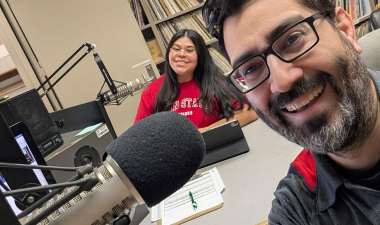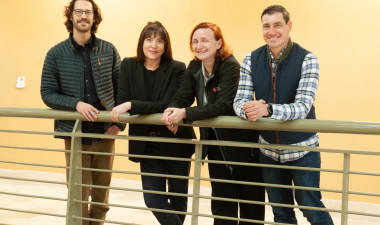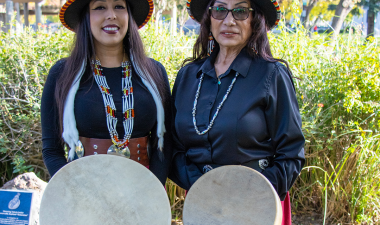
It’s titled the Deborah Kavasch 75th Birthday Salute, but the Nov.19 concert could easily be named Deborah and Friends.
The Stanislaus State composer and professor/coordinator of music theory and composition has assembled a group of friends and colleagues for the 7:30 p.m. concert in Snider Music Recital Hall.
Kavasch’s website lists more than 90 compositions and arrangements she has created, starting from her time as an undergraduate student at Bowling Green State University, Ohio, to her most recent composition “The Peace of Wild Things: A Reflection,” inspired by a Wendell Berry poem and recorded by the London Symphony Orchestra in June.
In determining which pieces to include in the milestone anniversary celebration, “it was mostly based on performer availability,” Kavasch said, thinking of friends she wanted to include. “I’ve written so much that I didn’t want to overwhelm.”
Former Stan State colleague Stephen Thomas would be in town for a piano duo recital with Dario Ntaca the previous Friday. Kavasch wanted recently retired and longtime colleague Joseph Wiggett, professor of voice, to return to campus for the special occasion. Other Stan State faculty members set to perform are faculty bass trombonist Jamie Dubberly, interim voice instructor Sandra Bengochea and staff accompanist and piano instructor Yan Yan Chan.
Brazil-based horn player Marcelo Olivatto, for whom Kavasch’s composition students wrote unaccompanied horn solos several years ago for Stan State’s New Music Festival, also will play.
“He lives in Sao Paolo, but he comes to the United States frequently to perform,” Kavasch said. “The last time we were in touch, he said he was going to be in San Francisco in November, and I said I was giving a recital, and he said, ‘Oh, can I play on it?’”
Olivatto will perform “Dragonslayer,” a solo horn piece Kavasch wrote in 2002 for a Stan State student to perform at her senior recital.
The program, about an hour’s worth of music, starts with Kavasch’s Op. 1, “the first piece I wrote, my first complete work,” she said.
Written when she was 19, she set it to Emily Dickinson’s “I died for beauty,” chosen probably because it was short, and she liked Dickinson’s poetry
The stories and memories of the inspiration for later pieces are clearer.
“Ages ago,” she said she wrote “Annabel Lee,” based on the Edgar Allen Poe poem.
“That was the song that provided much of the music for the chorus in my opera, ‘Annabel,’” she said, referring to the opera she and longtime collaborator and former Stan State faculty and Director of Global Affairs Linda Bunney-Sarhad wrote in 2022 for Opera Modesto.
Bengochea will sing Annabel’s aria from that opera, “All I Know.”

In addition to singing her first piece, “I died for beauty,” Kavasch will sing two other works with lyrics by Bunney-Sarhad. One, “Admonition,” is for solo voice and a pre-recorded mixed chorus created from her voice using the computer program Logic Pro to alter the tenor and bass vocal ranges without losing intelligibility. She premiered the other piece, “Refugee,” last year in Los Angeles.
“The funny thing about the piece is, Linda wrote the poem a number of years ago,” Kavasch said. “I started to work on it with the idea of writing for my voice plus violin and piano with specific performers in mind, but I couldn’t get anywhere with it. I have early drafts that show what I was working on, and it just wasn’t clicking, so I set it aside. When I finally returned to it and removed the violin part, suddenly it just worked.”
In between her singing performances, Dubberly and Thomas will play “…perchance to dream…,” which Dubberly commissioned in 2010, and Thomas will perform Kavasch’s “Nocturne,” which he commissioned in 2002.
Thomas and Ntaca will perform another piece they both commissioned from her, “Fantasy Suite,” based on the same four poems that inspired Rachmaninoff to write his first suite for two pianos, Fantasie (Tableaux) Op. 5.
Earlier plans to compose a piece for the two pianists for a celebration of Rachmaninoff never materialized. But last year, Thomas invited Kavasch to Brigham Young University-Idaho, where he teaches, to attend the final recital in a series featuring Chopin and other composers’ nocturnes. The program included the one she wrote as well as one written by her late husband, John Marvin. While there, she also taught several composition lessons and held a master class. It was during that visit Thomas once again suggested the Rachmaninoff piece.
“He said, ‘Write your music. Don’t try to be Rachmaninoff.’ The idea was not to imitate Rachmaninoff or try to write his music, but write my music inspired by the same poems,” she said.
The result is the final piece of the concert.
Before that, Kavasch will play a recording of the London Symphony Orchestra’s performance of her commissioned piece, “The Peace of Wild Things: A Reflection,” based on Berry’s poem, which Bunney-Sarhad introduced to Kavasch.
The recording will be released to the public by Parma Recordings on Jan. 10, 2025.
Asking Kavasch to choose a favorite piece of the program — or any of her compositions — would be like asking a mother to choose a favorite child. All have meaning to Kavasch and represent different time periods and were written for different instrumentation.
“It’s exciting,” Kavasch said. “Over the years I’ve given so many concerts, and many of them have been composition concerts. This is not an unusual idea. Composers often have concerts to celebrate milestone birthdays.”
By the time another milestone birthday rolls around, Kavasch will have more works from which to choose. She’s currently working on three new projects: a piece for Stanislaus State’s orchestra based on another Wendell Berry poem, her first composition for guitar — inspired by the recent Stan State Guitarraganza — and a piece she is considering for a percussion quartet.
“When I finished the piece for the London Symphony, I wondered what would be next,” Kavasch said.
Now, she at least knows what the next three pieces will be.




